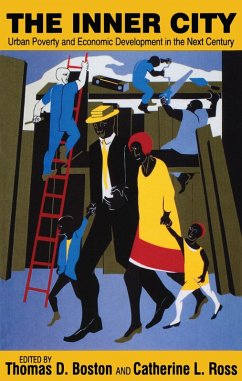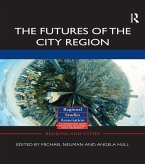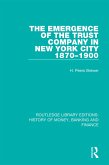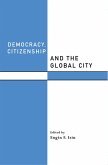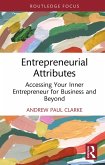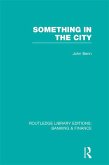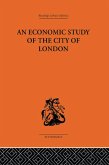The Inner City (eBook, ePUB)
Urban Poverty and Economic Development in the Next Century
Redaktion: Boston, Thomas D.; Ross, Catherine
45,95 €
45,95 €
inkl. MwSt.
Sofort per Download lieferbar

23 °P sammeln
45,95 €
Als Download kaufen

45,95 €
inkl. MwSt.
Sofort per Download lieferbar

23 °P sammeln
Jetzt verschenken
Alle Infos zum eBook verschenken
45,95 €
inkl. MwSt.
Sofort per Download lieferbar
Alle Infos zum eBook verschenken

23 °P sammeln
The Inner City (eBook, ePUB)
Urban Poverty and Economic Development in the Next Century
Redaktion: Boston, Thomas D.; Ross, Catherine
- Format: ePub
- Merkliste
- Auf die Merkliste
- Bewerten Bewerten
- Teilen
- Produkt teilen
- Produkterinnerung
- Produkterinnerung

Bitte loggen Sie sich zunächst in Ihr Kundenkonto ein oder registrieren Sie sich bei
bücher.de, um das eBook-Abo tolino select nutzen zu können.
Hier können Sie sich einloggen
Hier können Sie sich einloggen
Sie sind bereits eingeloggt. Klicken Sie auf 2. tolino select Abo, um fortzufahren.

Bitte loggen Sie sich zunächst in Ihr Kundenkonto ein oder registrieren Sie sich bei bücher.de, um das eBook-Abo tolino select nutzen zu können.
Michael Porter has argued that a sustainable economic base can be created in the inner city only if it has been created elsewhere: through private, for-profit, initiatives and investment based on economic self-interest and genuine competitive advantage-not through artificial inducements, charity, or government
- Geräte: eReader
- mit Kopierschutz
- eBook Hilfe
- Größe: 6.32MB
Andere Kunden interessierten sich auch für
![Sustainable Solutions: Let Knowledge Serve the City (eBook, ePUB) Sustainable Solutions: Let Knowledge Serve the City (eBook, ePUB)]() Sustainable Solutions: Let Knowledge Serve the City (eBook, ePUB)67,95 €
Sustainable Solutions: Let Knowledge Serve the City (eBook, ePUB)67,95 €![The Futures of the City Region (eBook, ePUB) The Futures of the City Region (eBook, ePUB)]() The Futures of the City Region (eBook, ePUB)44,95 €
The Futures of the City Region (eBook, ePUB)44,95 €![The Emergence of the Trust Company in New York City 1870-1900 (eBook, ePUB) The Emergence of the Trust Company in New York City 1870-1900 (eBook, ePUB)]() H. Peers BrewerThe Emergence of the Trust Company in New York City 1870-1900 (eBook, ePUB)34,95 €
H. Peers BrewerThe Emergence of the Trust Company in New York City 1870-1900 (eBook, ePUB)34,95 €![Democracy, Citizenship and the Global City (eBook, ePUB) Democracy, Citizenship and the Global City (eBook, ePUB)]() Democracy, Citizenship and the Global City (eBook, ePUB)88,95 €
Democracy, Citizenship and the Global City (eBook, ePUB)88,95 €![Entrepreneurial Attributes (eBook, ePUB) Entrepreneurial Attributes (eBook, ePUB)]() Andrew Paul ClarkeEntrepreneurial Attributes (eBook, ePUB)20,95 €
Andrew Paul ClarkeEntrepreneurial Attributes (eBook, ePUB)20,95 €![Something in the City (RLE Banking & Finance) (eBook, ePUB) Something in the City (RLE Banking & Finance) (eBook, ePUB)]() John BennSomething in the City (RLE Banking & Finance) (eBook, ePUB)45,95 €
John BennSomething in the City (RLE Banking & Finance) (eBook, ePUB)45,95 €![An Economic Study of the City of London (eBook, ePUB) An Economic Study of the City of London (eBook, ePUB)]() An Economic Study of the City of London (eBook, ePUB)45,95 €
An Economic Study of the City of London (eBook, ePUB)45,95 €-
-
-
Michael Porter has argued that a sustainable economic base can be created in the inner city only if it has been created elsewhere: through private, for-profit, initiatives and investment based on economic self-interest and genuine competitive advantage-not through artificial inducements, charity, or government
Dieser Download kann aus rechtlichen Gründen nur mit Rechnungsadresse in A, B, BG, CY, CZ, D, DK, EW, E, FIN, F, GR, HR, H, IRL, I, LT, L, LR, M, NL, PL, P, R, S, SLO, SK ausgeliefert werden.
Produktdetails
- Produktdetails
- Verlag: Taylor & Francis eBooks
- Seitenzahl: 357
- Erscheinungstermin: 12. Juli 2017
- Englisch
- ISBN-13: 9781351480871
- Artikelnr.: 48866746
- Verlag: Taylor & Francis eBooks
- Seitenzahl: 357
- Erscheinungstermin: 12. Juli 2017
- Englisch
- ISBN-13: 9781351480871
- Artikelnr.: 48866746
- Herstellerkennzeichnung Die Herstellerinformationen sind derzeit nicht verfügbar.
Thomas D. Boston, Catherine Ross
Co-Editors' Introduction
Abstracts of Contributions and Profiles of the Authors *
Part 1: Responses from the Academy
1: Economic Development Strategies for the Inner City: The Need for Governmental Intervention
2: Entrepreneurship and the Advantages of the Inner City: How to Augment the Porter Thesis
3: Business Strategy and Access to Capital in Inner-City Revitalization
4: Rebuilding Inner Cities: Basic Principles
5: Déjà-vu All Over Again: Porter's Model of Inner-City Redevelopment
6: Taking Back the Inner City: A Review of Recent Proposals
7: Political Economy of Urban Poverty in the 21st Century: How Progress and Public Policy Generate Rising Poverty
8: Promoting Economic Development in the Inner City: The Importance of Human Resources
9: The Porter Model of Competitive Advantage for Inner-City Development: An Appraisal
10: Michael Porter: New Gilder of Ghettos
11: Revitalizing the Inner City: A Holistic Approach
12: Reparations and the Competitive Advantage of Inner Cities
13: Potential Welfare Gains from Improving Economic Conditions in the Inner City
14: Is the Inner City Competitive?
Part 2: Responses from Community Service Providers
15: Overview of the Initiative for a Competitive Inner City
16: Making Comparative Advantage Work for Economic Opportunity
17: Economic Development or Social Development? A Strategy for Rebuilding Inner Cities
18: Mr. Porter's "Competitive Advantage" for Inner-City Revitalization: Exploitation or Empowerment?
19: A Dialogue on The Atlanta Project with Jane Smith, Executive Director
Part 3: Responses from Michael Porter and the Editors
20: An Economic Strategy for America's Inner Cities: Addressing the Controversy
21: Location Preferences of Successful African American-Owned Businesses in Atlanta
Abstracts of Contributions and Profiles of the Authors *
Part 1: Responses from the Academy
1: Economic Development Strategies for the Inner City: The Need for Governmental Intervention
2: Entrepreneurship and the Advantages of the Inner City: How to Augment the Porter Thesis
3: Business Strategy and Access to Capital in Inner-City Revitalization
4: Rebuilding Inner Cities: Basic Principles
5: Déjà-vu All Over Again: Porter's Model of Inner-City Redevelopment
6: Taking Back the Inner City: A Review of Recent Proposals
7: Political Economy of Urban Poverty in the 21st Century: How Progress and Public Policy Generate Rising Poverty
8: Promoting Economic Development in the Inner City: The Importance of Human Resources
9: The Porter Model of Competitive Advantage for Inner-City Development: An Appraisal
10: Michael Porter: New Gilder of Ghettos
11: Revitalizing the Inner City: A Holistic Approach
12: Reparations and the Competitive Advantage of Inner Cities
13: Potential Welfare Gains from Improving Economic Conditions in the Inner City
14: Is the Inner City Competitive?
Part 2: Responses from Community Service Providers
15: Overview of the Initiative for a Competitive Inner City
16: Making Comparative Advantage Work for Economic Opportunity
17: Economic Development or Social Development? A Strategy for Rebuilding Inner Cities
18: Mr. Porter's "Competitive Advantage" for Inner-City Revitalization: Exploitation or Empowerment?
19: A Dialogue on The Atlanta Project with Jane Smith, Executive Director
Part 3: Responses from Michael Porter and the Editors
20: An Economic Strategy for America's Inner Cities: Addressing the Controversy
21: Location Preferences of Successful African American-Owned Businesses in Atlanta
Co-Editors' Introduction
Abstracts of Contributions and Profiles of the Authors *
Part 1: Responses from the Academy
1: Economic Development Strategies for the Inner City: The Need for Governmental Intervention
2: Entrepreneurship and the Advantages of the Inner City: How to Augment the Porter Thesis
3: Business Strategy and Access to Capital in Inner-City Revitalization
4: Rebuilding Inner Cities: Basic Principles
5: Déjà-vu All Over Again: Porter's Model of Inner-City Redevelopment
6: Taking Back the Inner City: A Review of Recent Proposals
7: Political Economy of Urban Poverty in the 21st Century: How Progress and Public Policy Generate Rising Poverty
8: Promoting Economic Development in the Inner City: The Importance of Human Resources
9: The Porter Model of Competitive Advantage for Inner-City Development: An Appraisal
10: Michael Porter: New Gilder of Ghettos
11: Revitalizing the Inner City: A Holistic Approach
12: Reparations and the Competitive Advantage of Inner Cities
13: Potential Welfare Gains from Improving Economic Conditions in the Inner City
14: Is the Inner City Competitive?
Part 2: Responses from Community Service Providers
15: Overview of the Initiative for a Competitive Inner City
16: Making Comparative Advantage Work for Economic Opportunity
17: Economic Development or Social Development? A Strategy for Rebuilding Inner Cities
18: Mr. Porter's "Competitive Advantage" for Inner-City Revitalization: Exploitation or Empowerment?
19: A Dialogue on The Atlanta Project with Jane Smith, Executive Director
Part 3: Responses from Michael Porter and the Editors
20: An Economic Strategy for America's Inner Cities: Addressing the Controversy
21: Location Preferences of Successful African American-Owned Businesses in Atlanta
Abstracts of Contributions and Profiles of the Authors *
Part 1: Responses from the Academy
1: Economic Development Strategies for the Inner City: The Need for Governmental Intervention
2: Entrepreneurship and the Advantages of the Inner City: How to Augment the Porter Thesis
3: Business Strategy and Access to Capital in Inner-City Revitalization
4: Rebuilding Inner Cities: Basic Principles
5: Déjà-vu All Over Again: Porter's Model of Inner-City Redevelopment
6: Taking Back the Inner City: A Review of Recent Proposals
7: Political Economy of Urban Poverty in the 21st Century: How Progress and Public Policy Generate Rising Poverty
8: Promoting Economic Development in the Inner City: The Importance of Human Resources
9: The Porter Model of Competitive Advantage for Inner-City Development: An Appraisal
10: Michael Porter: New Gilder of Ghettos
11: Revitalizing the Inner City: A Holistic Approach
12: Reparations and the Competitive Advantage of Inner Cities
13: Potential Welfare Gains from Improving Economic Conditions in the Inner City
14: Is the Inner City Competitive?
Part 2: Responses from Community Service Providers
15: Overview of the Initiative for a Competitive Inner City
16: Making Comparative Advantage Work for Economic Opportunity
17: Economic Development or Social Development? A Strategy for Rebuilding Inner Cities
18: Mr. Porter's "Competitive Advantage" for Inner-City Revitalization: Exploitation or Empowerment?
19: A Dialogue on The Atlanta Project with Jane Smith, Executive Director
Part 3: Responses from Michael Porter and the Editors
20: An Economic Strategy for America's Inner Cities: Addressing the Controversy
21: Location Preferences of Successful African American-Owned Businesses in Atlanta
